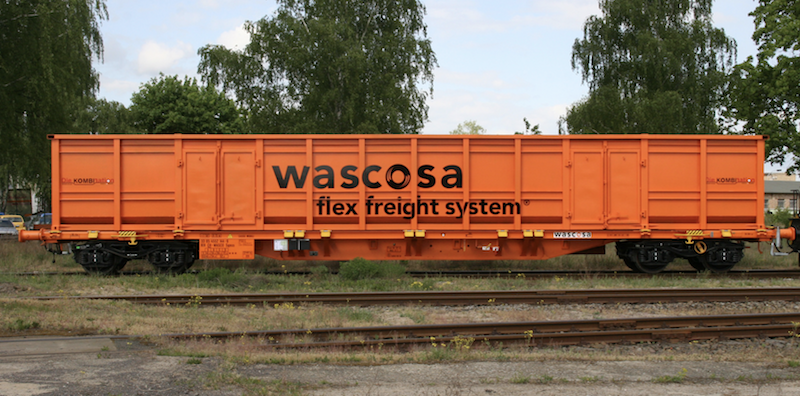
Developed by Wascosa, the flex freight system forms part of a vision that has seen the company expand to become Europe’s largest independent wagon leasing company.
In the transport industry at least, rail freight has become a major driver of the UK’s recovery from the Covid pandemic by providing a more reliable and ecological alternative to all too many trucks and trailers which clog up the country’s roads and motorways.
Indeed, it is estimated that the equivalent of seven million HGV loads have shifted to rail in the last year alone with the principal beneficiary being containerised traffic. As fuel prices continue to rise and concerns over the effects of climate change hit home this trend is set to continue.
So a transitional dynamic is now firmly established and with demand for rail-based transport solutions, in many cases, outstripping supply especially in terms of intermodal wagons, there has seldom been a better opportunity for innovative rail freight systems to make the leap from a niche concept to a mainstream solution.
There is a growing consensus that a more agile, economic and productive alternative to the traditional single purpose dedicated wagon is needed and this new departure is what Wascosa’s flex freight system, is all about.
Wascosa’s UK and Eire Agent Mick Tinsley explains: “As its name suggests, the system is a modular concept which allows flexible utilisation of a container flat wagon with a variety of superstructures that can be mounted on top according to the type of product to be transported, increasing the flexibility of the use of the base rail wagon, increasing its productive use and thus reducing its operating cost.
“For example, with its fold-away and full stackable stanchion cassettes, the system can be deployed for the transportation of timber or pipes but can be quickly converted to carry wood chippings, scrap metal, steel products or waste paper using another type of superstructure e.g. the E-type swap body, which is a modular box with four double doors and a steel floor
“Other modular superstructures also exist for transporting vehicles as well as automotive parts and the system is also compatible with most types of ISO containers and tank containers.
“The superstructure configuration possibilities are virtually endless, subject to any design conforming to ISO standards, to maintain rail gauge integrity.”
Several hundred of these modular freight wagons are now in service across the continent, notably with German chemical giant BASF, but also with the Swiss-based infrastructure company SERSA. Network Rail will take delivery of 260 wagons by the end of November this year, already with further superstructure options under consideration.
The obvious advantage over traditional dedicated wagons is that more types of cargo can be transported using fewer wagons which in turn can achieve more loaded journeys during their operating lifecycle, ultimately meaning a more efficient utilisation of the wagon fleet as well as a lower investment risk.
Tinsley continued: “By virtue of its adaptability, the system also opens up the possibility of transporting two different types of cargo back and forth on a given route thus avoiding unproductive empty running which is a major cost factor in dedicated trainload configurations.
“Also, because of the intermodal capability of superstructures such as open boxes and ISO containers, this system can serve non-rail connected, inner-city destinations, without the need for time consuming and problematic transhipment operations that would be required in the case of traditional rail wagons.
“Wascosa’s flex freight system is also more productive because of its suitability to seasonal and cyclical fluctuations and also offers a better cost to performance ratio in terms of repairs and servicing. This is because it has a higher standardisation of critical components making it easier and faster to maintain which in turn means less downtime and lost revenue because if the modular superstructure is damaged in any way it can simply be replaced without the whole wagon having to go to a repair shop.
“Finally, it’s very easy and fast to change the superstructure module using a forklift/handler which minimises wagon downtime and eliminates the need for separate pools of single use wagons.”
All in all, Wascosa’s flex freight system is a smart way of carrying different types of cargo without essentially changing the wagon and forms part of the vision which has enabled Wascosa to progress from being the fourth wagon rental company on the continent to Europe’s number one provider of freight wagon systems.
For more information, visit: www.wascosa.com